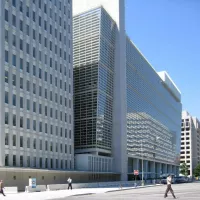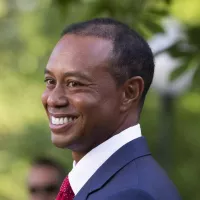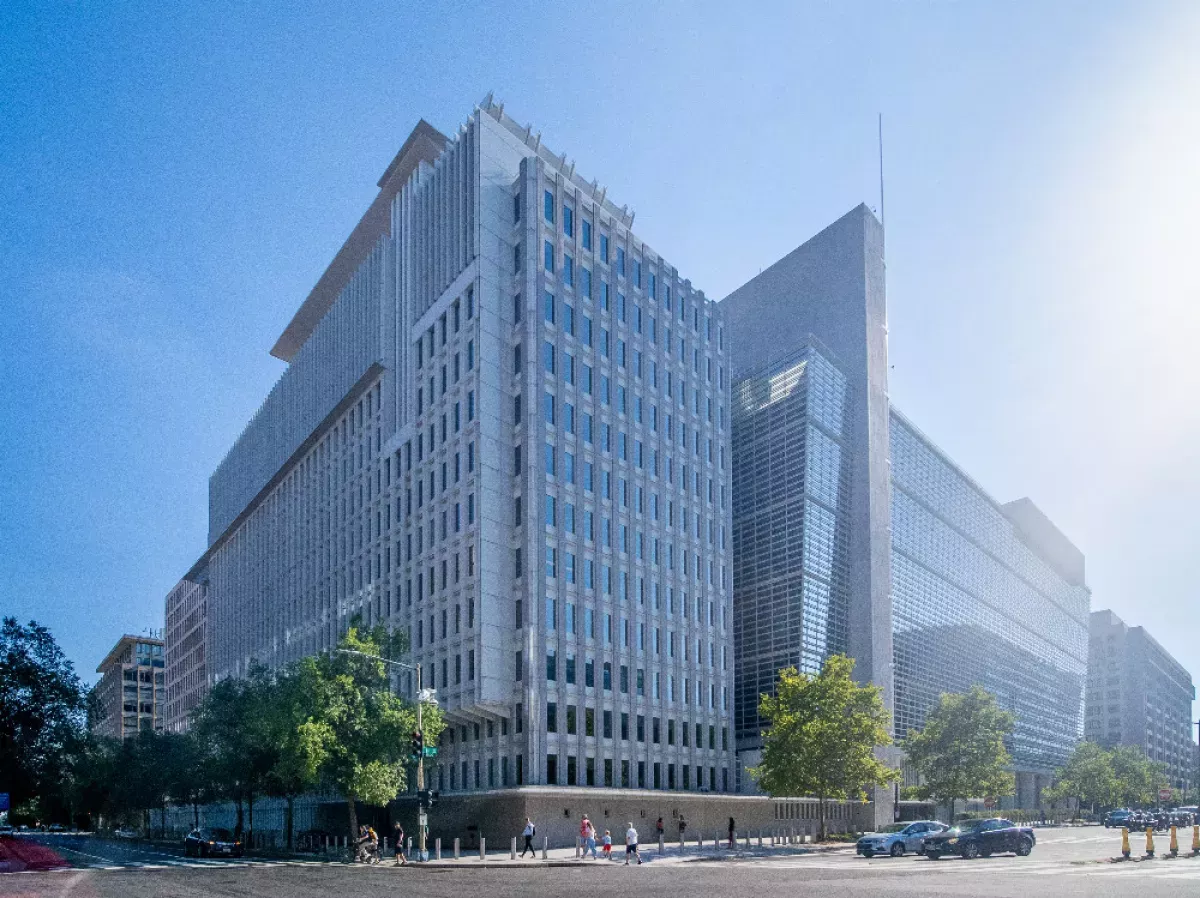The World Bank Group (WBG), headquartered in Washington, D.C., is a family of five international organizations that provide leveraged loans and assistance to developing and transition countries. Its mission is to eradicate extreme poverty and promote shared prosperity. In 2021, the WBG provided nearly $99 billion in loans and aid. Over the ten years leading up to 2015, approximately $117 billion was disbursed through Development Policy Financing. The five organizations comprising the WBG include the International Bank for Reconstruction and Development (IBRD), the International Development Association (IDA), the International Finance Corporation (IFC), the Multilateral Investment Guarantee Agency (MIGA), and the International Centre for Settlement of Investment Disputes (ICSID).
July 1944: United Nations Monetary and Financial Conference
The Bretton Woods agreements, the foundation of the World Bank Group, resulted from the United Nations Monetary and Financial Conference held from July 1-22, 1944.
December 27, 1945: Republic of China Joins World Bank
The Republic of China joined the World Bank on December 27, 1945.
December 1946: Formal Establishment of the World Bank Group
The World Bank Group formally came into existence on December 27, 1946, after international ratification of the Bretton Woods agreements.
May 1947: First World Bank Loan
The World Bank approved its first loan of $250 million to France for postwar reconstruction on May 9, 1947. This remains the largest loan issued by the bank to date in real terms.
1951: Establishment of Osiander Committee
In 1951, the Osiander Committee was established to prepare and evaluate the World Development Report.
1957: Creation of World Bank Affiliated Agencies
Between 1957 and 1988, four agencies affiliated with the IBRD were created, forming the World Bank Group.
April 16, 1980: People's Republic of China Replaces Republic of China in World Bank
On April 16, 1980, the People's Republic of China replaced the Republic of China in the World Bank. The ROC, having moved its government to Taiwan after the Chinese Civil War, continued its membership until this date.
1988: Creation of World Bank Affiliated Agencies (Cont.)
The final affiliated agency to join the World Bank Group (IBRD) between 1957 and 1988 was created. These agencies, along with the IBRD, compose the World Bank Group.
July 2001: Launch of Extractive Industries Review
In July 2001, the World Bank launched the Extractive Industries Review (EIR) to assess its involvement in the oil, gas, and mining sectors.
2002: EIR Stakeholder Consultations
Throughout 2002, Emil Salim, head of the Extractive Industries Review, held stakeholder consultations on the World Bank's role in extractive industries.
2003: EIR Stakeholder Consultations (Cont.)
The Extractive Industries Review continued its stakeholder consultation process throughout 2003.
January 2004: Publication of EIR Final Report
The Extractive Industries Review (EIR) published its final report, "Striking a Better Balance," in January 2004, recommending a phase-out of World Bank involvement in fossil fuel and mining projects by 2008.
September 2004: World Bank Management Response to EIR
In September 2004, the World Bank published its Management Response to the EIR, rejecting many of its conclusions but ultimately leading to policy changes regarding oil, gas, and mining.
2008: Target Date for Phasing Out Fossil Fuel and Mining Investments
The Extractive Industries Review recommended that the World Bank phase out its fossil fuel and mining investments by 2008 and shift towards renewable energy.
November 2009: United States Voting Power in World Bank
As of November 15, 2009, the United States held significant voting power (16.4%) within the World Bank, allowing it to effectively veto major changes.
2009: Criticism of World Bank Loan to Dinant
Following the 2009 Honduran coup d'état, the Compliance Advisor/Ombudsman (CAO) criticized a World Bank loan provided to the palm oil company Dinant due to killings of Campesinos in the region of Dinant's operation.
2015: World Bank Group Development Policy Financing
As of 2015, the World Bank Group's total lending through Development Policy Financing over the preceding 10 years was approximately $117 billion.
May 2016: World Bank Group Membership Expansion
As of May 2016, all 188 UN members and Kosovo, who are members of the World Bank Group, also participated in at least one of the other four organizations (IDA, IFC, MIGA, and ICSID).
October 2019: Anshula Kant Becomes Managing Director of World Bank
Anshula Kant assumed the position of Managing Director and World Bank Group Chief Financial Officer on October 7, 2019.
2019: Congressional-Executive Commission on China Questions World Bank Loan
In 2019, the Congressional-Executive Commission on China raised concerns with the World Bank regarding a loan in Xinjiang, China, that was allegedly used to purchase surveillance equipment, prompting an internal investigation.
August 2020: US Lawmakers Question World Bank Loan Disbursement in Xinjiang
In August 2020, U.S. lawmakers questioned the continued disbursement of a World Bank loan in Xinjiang, China, over concerns about its use for security and surveillance equipment.
2021: World Bank Group Lending and Assistance
In 2021, the World Bank Group provided around $98.83 billion in loans and assistance to developing and transition countries.
Mentioned in this timeline

The Chinese Civil War was a conflict between the Kuomintang...
China officially the People's Republic of China is an East...

The World Bank is an international financial institution offering loans...
France officially the French Republic is primarily located in Western...

War is defined as an armed conflict involving the armed...
Taiwan officially the Republic of China ROC is a country...
Trending

44 minutes ago Larson and SVG collision leads to wreck in NASCAR Atlanta race.

45 minutes ago Chastain and Hill Collide on Final Lap at Atlanta's O'Reilly Race

45 minutes ago Hocevar Admits Fault in Logano Incident, Hamlin Involved in Atlanta NASCAR Crash

45 minutes ago Tiger Woods eyes Masters return, not ruling out participation, Scheffler favored in 2026.

46 minutes ago Jayson Tatum's Injury Status Updates, Return Date Still Unknown Amid Celtics Practice

2 hours ago Sebastian Korda Dominates Tommy Paul to Win Delray Beach Open Trophy.
Popular

Jesse Jackson is an American civil rights activist politician and...

Barack Obama the th U S President - was the...

Bernie Sanders is a prominent American politician currently serving as...

Michael Joseph Jackson the King of Pop was a highly...
WWE Raw a professional wrestling television program by WWE airs...
The Winter Olympic Games a major international multi-sport event held...
